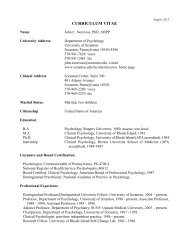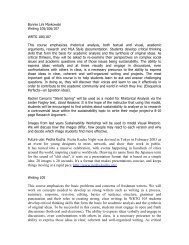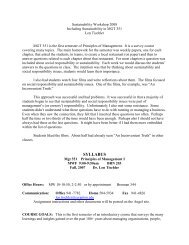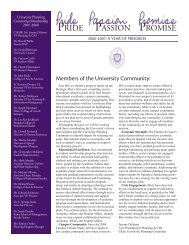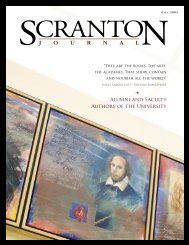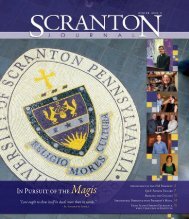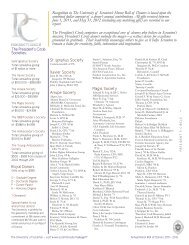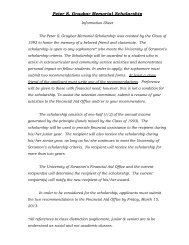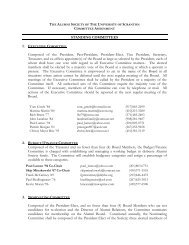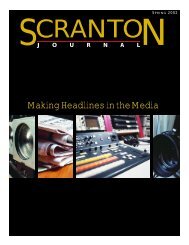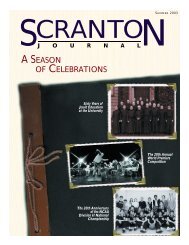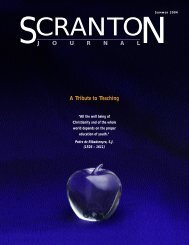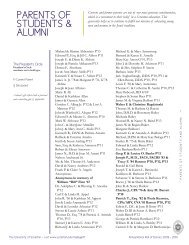1. Ultimate Reality and Meaning - The University of Scranton
1. Ultimate Reality and Meaning - The University of Scranton
1. Ultimate Reality and Meaning - The University of Scranton
Create successful ePaper yourself
Turn your PDF publications into a flip-book with our unique Google optimized e-Paper software.
4<br />
(c) if about tribes, peoples or countries: name <strong>and</strong> geographical setting; history <strong>of</strong> studies <strong>and</strong><br />
sources; origin <strong>and</strong> history; major influences; social structure, commerce, industry, government;<br />
language, religion, art, music, etc., influence on other people, contributions; questions to be studied;<br />
description <strong>of</strong> how life is seen by the group; description <strong>of</strong> the corresponding symbols, images <strong>and</strong><br />
the network <strong>of</strong> their correlative function; description <strong>of</strong> how the group tries to survive by adapting<br />
itself to or by manipulating the pattern <strong>of</strong> life.<br />
2 <strong>Ultimate</strong> <strong>Reality</strong> <strong>and</strong> <strong>Meaning</strong> <strong>of</strong> Subject Matter Studied in Depth <strong>and</strong> Social Impact:<br />
(a) description <strong>and</strong> definition <strong>of</strong> important names, terms, symbols, metaphors used to express<br />
ultimate reality <strong>and</strong> meaning <strong>of</strong> human existence.<br />
(b) elaboration <strong>of</strong> basic idea or ideas; here the contributor should be guided by such questions as: Is<br />
the ultimate reality <strong>and</strong> meaning dealt with directly or indirectly? How is it expressed: as space<br />
model, e.g., milieu, horizon, context, etc.; time model, e.g., origin, cause, ultimate, final, etc.;<br />
person model, e.g., God, spirit, spirits, etc.? What is the final horizon, the central idea in terms <strong>of</strong><br />
which the meaning <strong>of</strong> human existence is understood? What is the conception <strong>of</strong> the universe, its<br />
origin <strong>and</strong> destiny, if there is one? What is the role <strong>of</strong> a human being, his/her moral ends <strong>and</strong> moral<br />
relation to the universe <strong>and</strong> its creator(s), if any, or to the totality <strong>of</strong> existence? What is the<br />
logico-genetic development <strong>of</strong> what is taken as ultimate? Are these ideas original or derivative? If<br />
derivative, from whom <strong>and</strong> how? What is the meaning <strong>of</strong> the universe? What is the meaning <strong>of</strong><br />
human existence? What does one expect from life? What are the desires one expects to be fulfilled<br />
(to harmonize the world?, to live forever?, to let family, clan, society continue to survive?, to be<br />
united with God or with the universe? etc.)? What is the relation between the desires, the reality in<br />
which people live <strong>and</strong> the heaven to which they want to go? How is happiness or a better future<br />
visualized? What is one expected to do to reach the desired happiness? In what context do such<br />
desires make sense <strong>and</strong> in what context do they not? Do these ideas contribute to a greater <strong>and</strong><br />
deeper underst<strong>and</strong>ing <strong>of</strong> ultimate reality <strong>and</strong> the meaning <strong>of</strong> human existence or experience?<br />
<strong>The</strong> contributor should not dwell on beliefs incidental to these ultimates, unless essential for<br />
underst<strong>and</strong>ing them. It is also expected that he or she will criticize <strong>and</strong> evaluate these basic ideas.<br />
II FORMAT<br />
1 Manuscripts: A manuscript should be submitted in triplicate to the relevant Section Editor or to<br />
the Editor. <strong>The</strong> manuscript will be sent out to two or three scholars for comment. <strong>The</strong> comment <strong>and</strong><br />
the author's reply might be published in the journal. <strong>The</strong> format for manuscripts submitted<br />
after January 1, 2012 will be the MLA Stylesheet.<br />
2 Language: English is the preferred language. All articles should be submitted in English, but<br />
other languages will be used in the case <strong>of</strong> exceptional papers where English submission is difficult.<br />
3 Length: Preferred maximum length <strong>of</strong> any article is 40 double-spaced pages.<br />
4 References:<br />
(a) References should be included in the text within parentheses <strong>and</strong> arranged as this<br />
example: (Hartshorne 156-158)<br />
(b) All references should be listed alphabetically at the end <strong>of</strong> the manuscript, author, title,<br />
publisher, etc. <strong>and</strong> should be arranged as in the following examples:<br />
Book: Hartshorne, Charles. <strong>The</strong> Divine Relativity. A Social Conception <strong>of</strong> God. 3rd<br />
edition. New Haven: Yale <strong>University</strong> Press, 1967.<br />
Article: Horvath, Tibor. “Encyclopedia <strong>of</strong> Human Ideas on <strong>Ultimate</strong> <strong>Reality</strong> <strong>and</strong><br />
<strong>Meaning</strong>: A Plan for a New Encyclopedia.” Revue de l’Universite d’Ottawa. 39 (1969):<br />
94-106.



